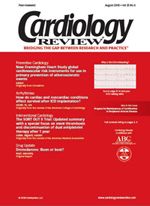Publication
Article
Cardiology Review® Online
Untreated diabetes mellitus in coronary artery by pass graft surgery
Author(s):
Lauruschkat and colleagues entitled their article "Undiagnosed diabetes mellitus in coronary artery bypass graft surgery."
Lauruschkat and colleagues entitled their article “Undiagnosed diabetes mellitus in coronary artery bypass graft sur­gery.” In their study of patients undergoing coronary artery bypass graft (CABG) surgery from 1996 to 2003, 5.2% had fasting blood glucose levels > 126 mg/dL. These patients had a higher 30-day mortality rate, longer periods of ventilatory support, more frequent reintubation, and a higher incidence of cardiopulmonary resuscitation in the postoperative period. Patients with untreated diabetes also had a higher incidence of unstable angina, New York Heart Association functional class IV symptoms, recent myocardial infarctions (MIs), 3-vessel disease, and increased total cholesterol levels.
I have entitled my commentary “Untreated diabetes mellitus in coronary artery bypass graft surgery” because, unfortunately, this study reflects what happens when increased glucose levels are not aggressively treated during CABG surgery. The results from this study are similar to those of Anderson and colleagues, who found that patients with elevated fasting blood glucose levels had increased short- and long-term mortality following CABG surgery.1 We were not told whether tight glycemic control was practiced by Lauruschkat and colleagues or what the cause of death was in the patients with undiagnosed diabetes. Furthermore, no mention was made of glucose values during surgery or in the immediate postoperative period, although I suspect that they were highest in this group of patients. These patients also had a higher risk profile, reflected in more unstable syndromes, congestive heart failure, and recent MIs, and more extensive coronary artery disease. This alone could have accounted for the increased mortality and morbidity, especially the need for prolonged ventilatory support seen in these patients. However, our own results have shown that tight glycemic control during CABG surgery in patients with diabetes independently decreases the need for inotropic support, limits weight gain, and results in shorter periods of ventilatory support.2
What are the take-home messages from this study? Unfortunately, as surgeons, we continue to see a significant percentage of patients referred for bypass surgery with abnormal fasting blood glucose levels and increased serum glucose levels during and immediately following surgery. These patients, whether they have insulin resistance due to the metabolic syndrome or undiagnosed diabetes, should receive aggressive treatment of serum glucose to maintain levels < 180 mg/dL. Postoperatively, they should all receive an aspirin, an HMG-CoA reductase inhibitor (regardless of their baseline low-density lipo­protein cholesterol levels), an angiotensin-converting enzyme inhibitor, and a beta blocker. If necessary, antiglycemic medication should be initiated. Unfortunately, for many patients, the diagnosis of abnormal lipid and glucose metabolism is not made until after an acute coronary event or the need for revascularization arises. As clinicians, we must diagnose and treat these risk factors aggressively, both during surgery and in the postoperative period if these patients are to enjoy the long-term benefits afforded by surgical and percutaneous revascularization.






